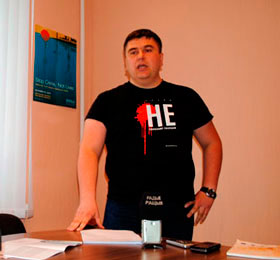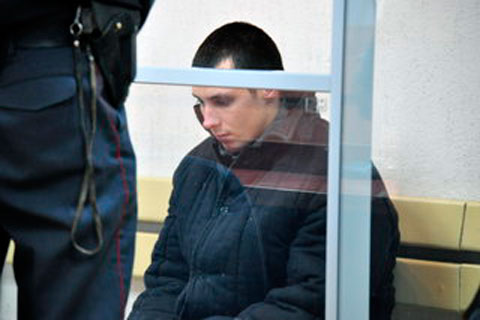Death sentence for Aliaksandr Hrunou may be commuted to life imprisonment
-

- Andrei Paluda, coordinator of the campaign "Human Rights Defenders against the Death Penalty in Belarus"
Representatives of the campaign "Human Rights Defenders against the Death Penalty in Belarus," who have been monitoring the trial of Aliaksandr Hrunou, do not rule out the possibility of replacing the execution with life imprisonment.
The Criminal Division of the Supreme Court of Belarus pronounced on October 22 its decision on Aliaksandr Hrunou’s appeal, overturning the death sentence handed down by the Homel Regional Court.
According to coordinator of the “Human Rights Defenders against the Death Penalty in Belarus” campaign Andrei Paluda, this is the first case since the launch of the campaign in 2009.
“The judges of the Supreme Court, referring to Article 385 of the Code for Criminal Procedures of the Republic of Belarus, canceled the sentence and sent the case for revision to the Homel Regional Court. So far, we do not know the exact reasons for the decision, but most likely the panel of judges drew attention to the violations specified in his attachment to the appeal by lawyer Siarhei Krasnou, referring to the international standards of human rights and the International Covenant on Civil and Political Rights,” says Andrei Paluda.

Aliaksandr Hrunou during the trial at the Homel Regional Court. Photo by tut.by.
First of all, human rights defenders emphasize the violations mentioned by the counsel in connection with the mental state of Aliaksandr Hrunou. The lawyer said that in spite of the psychological and psychiatric examination of October 24, 2012, which was already in the case file, and according to which Hrunou was diagnosed with a psychiatric disorder in the form of mixed personality disorder, the court appointed another examination (although there were no reason for that) and then used its results as a basis for the guilty verdict.
In the attachment to the appeal lawyer Siarhei Krasnou wrote on this subject:
“That is, the trial court took into account the opinion of inpatient forensic psychological and psychiatric examination No. 123 of April 5, 2013, according to which Aliaksandr Hrunou was found sane during the commission of the crime and the period of adjudication.
However, the said examination contains a number of contradictions:
- The descriptive part of the examination indicates that in his early childhood Aliaksandr Hrunou suffered the death of his father;
- After the death of his father, Aliaksandr Hrunou suffered the appearance in the house of his mother’s cohabiter, who constantly forced her to drink alcoholic beverages;
- On this basis, Aliaksandr Hrunou received treatment in a psychiatric hospital, and was diagnosed with “mental retardation” and “psycho-like syndrome” when leaving the clinic;
After being discharged from a psychiatric hospital, Aliaksandr Hrunou from 2001 to 2005 was registered in the mental and substance abuse clinics with a diagnosis of “unsocialized conduct disorder” and “conduct disorder” and was removed from the register in relation to deprivation of liberty over a different criminal offense...
Apart from that, the testimony of witnesses examined in court (his common-law wife and friends) clearly suggests that he could at any time without reason run away from home, discos and other places; could unnecessarily go run on the roofs of houses or even go for a swim in the nearby lake in the middle of the night. Even in his final statement to the court Aliaksandr Hrunou could not explain the motives of the crime – he was only able to say “I do not know how this could happen.” Meanwhile, the examination asserts the opposite – Aliaksandr Hrunou has no temporary mental disorder and has never suffered from feeblemindedness... And all this is despite the fact that Aliaksandr Hrunou received no treatment, because at that time he was in prison...”
Hrunou’s lawyer also stressed that given the controversies in the examination of the health of his client, the judicial bodies failed to summon and question the persons who gave such a conclusion, to eliminate the contradictions of the examination, and used its contradictory findings as the basis for a conviction with the highest punishment possible – execution.
The lawyer also pointed out certain irregularities in the examination of the witnesses: “Violation of Article 27 of the Constitution is the questioning of Hrunou’s cohabiter A.M. Marozava. According to the trial record, Marozava said that she had lived with Hrunou for a year and a half and run the house together. At the same time, both at the previous investigation and in court she did not specify whether she considered Hrunou a close person. Her questioning could have been only continued after receiving a negative response. In the case of a positive answer, Marozava should have clarified whether she would be testifying against Hrunou. But this is absent from the criminal case file, and according to Article 105 of the CCP, the testimony of this witness is not valid. Despite this violation, the court used Marozava’s testimony as the basis of the guilty verdict.”
The defense named one more weighty circumstance: “The court of first instance sentenced Hrunou to capital punishment, without taking into account as mitigating circumstances his confession to the crime and his voluntary cooperation with the investigation. Although he pleaded guilty, the panel of judges, assessing his voluntary confession, took it as proof of his guilt in the crime, since, as it pointed out in the sentencing, the facts originally set out in it were confirmed in the course of the trial, but did not accept the confession as a mitigating circumstance.”
Apart from that, from the very beginning there was a violation of Hrunou’s right to protection, as indicated by the lawyer: “After Hrunou was taken to the police station, in accordance with Article 45 of the Code for Criminal Procedures, he should have been provided with a lawyer, and only then he could have been questioned.
That is, in this case four provisions of the law were violated:
- Article 62 of the Constitution, according to which everyone is entitled to legal assistance for the exercise and protection of rights and freedoms. The lawyer arrived at the police station when Hrunou had already signed his confession. That is, Hrunou did not even have time to exercise his right to free legal advice, despite the particularly grave charge, which could result in the capital punishment.
- Article 27 of the Constitution. No one shall be compelled to testify against themselves, their family members, close relatives. Evidence obtained in violation of the law have no legal force.
- Paragraph 1 of Article 14 of the International Covenant on Civil and Political Rights and Article 6 of the Covenant.
- Paragraph 3 (b) of Article 14 of the International Covenant on Civil and Political Rights.
Activists of the campaign "Human Rights Defenders against the Death Penalty in Belarus" believe that if all these and other circumstances are taken into account and they receive a legal assessment by the court of first instance during the retrial, the death sentence for Aliaksandr Hrunou may be replaced with another penalty, e.g. life imprisonment.

